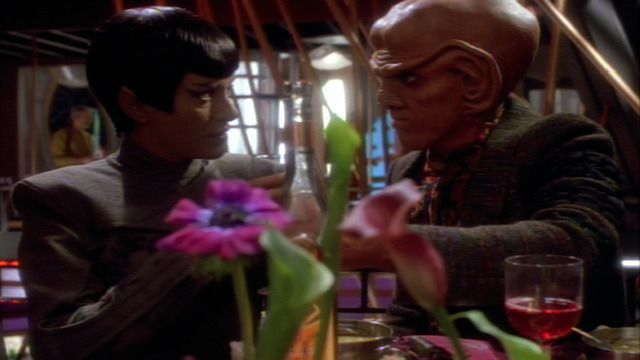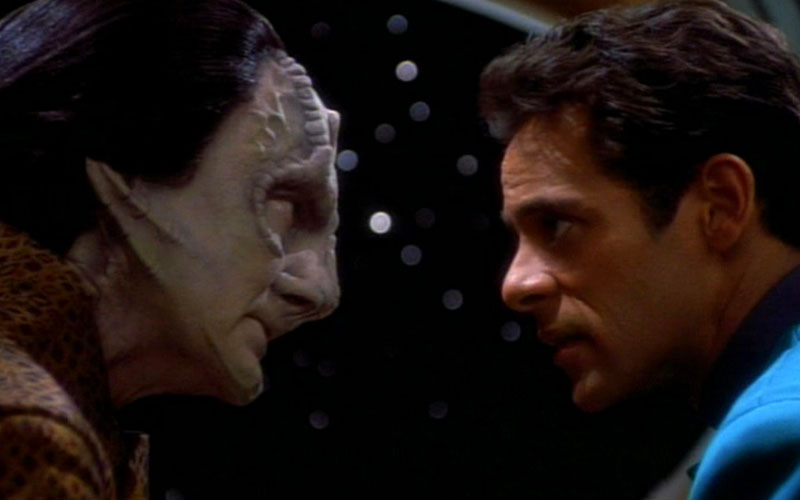“The Maquis, Part II”
In the jungle, the mighty jungle, the Maquis lurk tonight...
Unusually for Star Trek, this is a rare instance where the second instalment of a two-parter is stronger than the first. I think the credit goes to Ira Steven Behr who not only takes over the writing duties, but also uses it as something of a mission statement for his upcoming stewardship of the series.
The brilliant scene between Sisko, Nechayev and Kira at the start of act one contains one of the series’ oft-quoted lines, “It’s easy to be a saint in paradise.” On one hand, I think that’s a simplification and not necessarily true (from what I’ve seen, affluence certainly doesn’t confer saintliness, and along with it often comes increasing narcissism, dissatisfaction and what some call “affluenza”). But this is, nevertheless, one of the most important lines in the entire series, because it reveals how DS9, under Behr’s tenure, would explore the human condition by deconstructing that “paradise”, or at least revealing its cracks. This was, and perhaps still is,
heresy to some—but, for me, it’s what makes DS9 the most human-feeling Trek series since TOS, warts and all. This was radical stuff for the time, given that TNG featured virtually infallible heroes and a Federation that was generally beyond reproach. It’s no wonder that DS9 was considered the black sheep of the Trek family.
I still have some reservations about the overall execution of the Maquis storyline here, and I don’t consider this one of DS9’s classic two-parters. The Maquis/Cardassian conflict is abstract in nature: we don’t see it, except for snatches, and by and large it all unfolds via words, and more words. I also don’t really get much of a feel for the DMZ colonists’ plight here, nor why they’re determined to risk a bloody galactic war rather than simply hop over to another planet, of which there would seem to be no shortage. Season one’s “Progress” did a superb job making us (or, at least,
me) feel for Mullibok’s plight; we got into the mind and heart of that character and understood why he was holding out and why he had a psychological attachment to his haven on the moon. Even though Kira arguably made the correct decision, it was a painful one because we had sympathy for the man she was evicting. We don’t get into the minds and hearts of the colonists here. The few that we do see feel like plot devices rather than actual characters.
Again, this two-parter’s biggest mistake was making Cal Hudson the face of the Maquis. I found Bernie Casey a little better here than in the first part, but it’s still not a great performance—although, to be fair, the character isn’t particularly well-written either. He doesn’t at any point behave like a Starfleet officer. He behaves like an absolutist; an extremist who never takes a
second to consider Sisko’s position and his pleas. We’re told that these guys are best of friends, but we never see even a hint of that here. While there’s some potentially strong material here, and the symbol of Hudson’s uniform is used well throughout, it falls fairly flat, and I never really feel for Sisko’s loss...I guess because Hudson seems like a bit of a dick, and it’s a case of “you’re better off without him, Ben.”
Interestingly, I think TNG did a better job of making the Maquis more sympathetic in “Journey’s End” and “Preemptive Strike”. I find it hard to relate to them here. They seem far too quick to jump to violence, which is quite a stretch given that a number of them are former Starfleeters. I mean, what happens to those prime Starfleet values of negotiation and peaceful solutions—do they just instantly go out the window as soon as they hit a bump?
That said, what I like about this storyline is that there’s no right or wrong answer. It’s an ambiguous and muddled situation, and, outside of Sisko and our crew, who earnestly want to avoid violence and war, no one is entirely a hero or a villain here. Marc Alaimo continues to impress as Dukat, and it’s fun watching him team up with Sisko and co and at times
almost seem like a good guy. His greatest scene is undoubtedly during his interrogation at the hands of the Maquis. Rather than being remotely apprehensive, he smugly goads his interrogators with barely concealed contempt, completely belittling the wannabe-terrorists.
One of the things this second part does better than the first is that rather than simply reacting to external events, the crew recover their sense of agency and drive the plot by taking decisive action. The pace is tighter and Ira Behr’s characteristically breezy, witty dialogue makes for some truly enjoyable scenes. I was a little underwhelmed by the Quark/Sakonna sub-plot in the first part, as it seemed to bring out Quark’s less endearing character points: namely his sleazy objectification of feeemales, and his tendency to let greed override moral scruples. Fortunately, Behr does something quite special with him in this episode; something that would happen quite often in future episodes. While keeping him true to his Ferengi conditioning and personality, Quark delivers some incisive political commentary, explaining why war is a bad thing (in terms of profit, of course). It’s fun watching him outwit a Vulcan with logic, and an indication that his character can serve as much more than simple comic relief.
It’s nice to have some actual action in the finale, even if Hudson escapes with no real comeuppance. It’s a testament to how unlikeable I ended up finding the character that I was actually rooting for him to be brought down a peg or two. The loss of his friendship clearly hits Sisko hard, but Hudson doesn’t seem to care one little bit. He behaves like a man radicalised, and utterly unable to consider things from any broader perspective, which is a rather terrifying (and sadly not uncommon) human trait. Originally Ira Behr wanted Hudson killed off in the finale, which would have felt more satisfying dramatically, although Michael Piller nixed this idea.
The conclusion is...well, inconclusive. Nothing feels like a decisive victory and the seeds of future troubles have been well and truly sown. This definitely feels like a transition episode for DS9, and one that foreshadows the morally grey themes relating to Starfleet, duty and war that would follow.
Rating: 8




